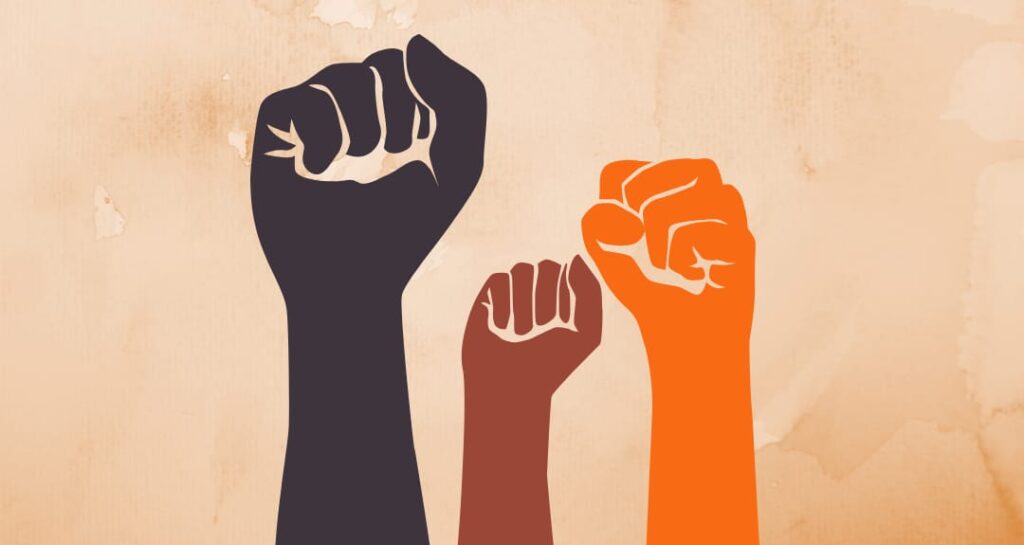
As Women’s Assembly of Migrants Coordination, in these months we have voiced the essential struggles of migrant women. These struggles have shown that it is impossible to defeat exploitation and patriarchy without fighting together against racism. Migrant women’s strikes that we have been nourishing and supporting for months, together with the Yoox workers and others, are the essence of the feminist strike. Exploitation becomes more intense and violent if you depend on a residence permit and if you have children who are born here but are not citizens. Male chauvinism is legitimized by the fact that we are migrants and therefore forced to accept salaries and contracts that only enrich the bosses and expose us to violence. Racism affects us more as women, makes us depend on our husbands’ papers, forces us to work as domestic and care workers, or imposes us absurd shifts in factories or in the fields, makes the color of our skin a burden. To fight against all this means to carry on a struggle that concerns all women, migrant and non-migrant, and that opposes the exploitation of all.
This year, the 8th of March comes in a different context from previous years. All over the world, the global women’s movement had to rethink itself. New transnational pathways of struggle have been strengthened precisely to respond to the attacks of governments that are taking advantage of the pandemic. This year’s feminist strike must make this force explosive and must be an essential and transnational strike, which focuses on our lives as women and migrants and on our struggles against exploitation, patriarchy, and racism. In our fight against their intertwinement lies the possibility for all of us to obtain the freedom we want. Only if our feminism starts from these struggles it will be able to respond to the challenges we face. Only by starting from the political meaning of these struggles can movements and trade unions be an instrument of empowerment.
On the 8th of March, the struggle against racism cannot be just one thing among many others which are part of the feminist mobilization, because patriarchal racism will be a central pillar in the “recovery” phase. The Family Act designed by the government to ensure the reconciliation of work and motherhood, as well as the selective and hierarchical inclusion of women in the labor market, will exclude most migrant women from the benefits. In order to obtain the ‘child allowance’, in fact, it will be necessary to have a work contract of at least two years or a long-term residence permit. These criteria have long been impossible to meet, even more so during the pandemic. Most migrant women excluded from the single allowance will therefore have to work twice as hard to live and guarantee a future to their sons and daughters. Possibly, they will work in exchange for a salary as babysitters for other mothers who will get the Family Act allowance. In all cases, it will be their sons and daughters who will pay a heavy price.
Similar measures are looming everywhere as if the sacrifices that have been imposed on us so far were not enough: we received no bonuses and subsidies; the regularization summer has established that the only reconciliation for migrants is between waged work, poorly paid domestic work, and free care work. This is demonstrated by the ‘anti-Covid measures’ used as an excuse to impose unbearable shifts, increase the workload by reducing breaks, and decrease wages by canceling meal vouchers. After 11 months, most of us are working two jobs, at best, because part-time shifts have been arbitrarily imposed ‘because of’ Covid-19, or because the layoff allowance, if granted, is not enough to buy food, let alone pay the rent. So a second job, often informal, is an obligation and not an alternative. Just as it is an obligation that these second jobs, especially when we are migrants, are those of care or domestic workers. Women’s and “foreigners”’ work never goes out of fashion and the regularization of some of us has certainly not solved the problem of us all. On the other hand, it is a lesson they are already trying to teach us at school, where racist and class hierarchies are being reaffirmed even more harshly with the pandemic.
If the fight against patriarchal violence does not involve fighting against the institutional racism that amplifies the exploitation of migrant women, the freedom we fight for can never be truly collective. As the strike of the migrant women workers of Yoox showed, it is possible to find together the courage to struggle even in the most difficult conditions and to make one’s rage heard. This is what must happen on the 8th of March.
Tags 8th march feminism patriarchy strike
 Coordinamento Migranti Il Coordinamento migranti Bologna e provincia è nato nel 2004.
Coordinamento Migranti Il Coordinamento migranti Bologna e provincia è nato nel 2004.


